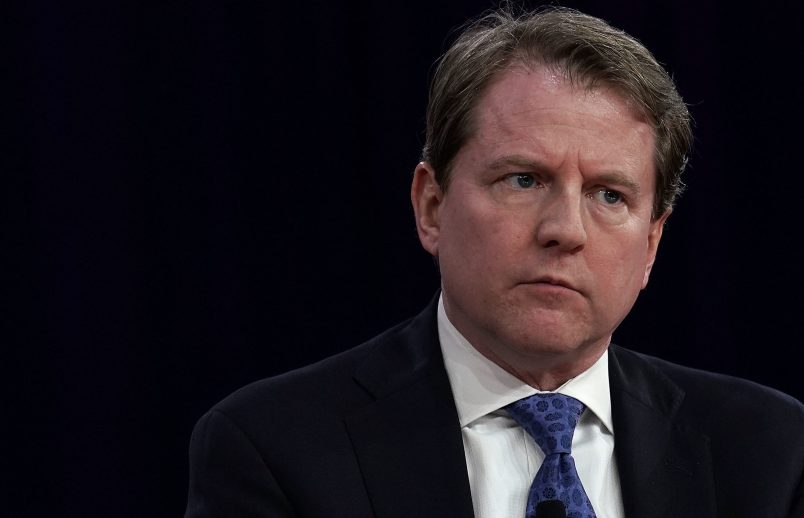After the full U.S. Court of Appeals for the D.C. Circuit had rejected its previous reasons for not enforcing the House’s Don McGahn subpoena, a right-leaning panel of appellate judges found another rationale to stymie the demand that he testify.
By a 2-1 vote, the panel said on Monday that the House Judiciary Committee could not seek court enforcement of the subpoena without Congress first passing a law to give the House that right to do so.
The two appellate judges, both Republican appointees, disagreed with the House’s argument that such authority is implied in the Constitution.
“Because the Committee lacks a cause of action to enforce its subpoena, this lawsuit must be dismissed,” the case said.
If allowed to stand, the ruling essentially guts the House’s subpoena power. The same panel of judges had originally thrown out the McGahn subpoena by claiming that courts had no authority to settle subpoena disputes between the Executive and Legislative branches. The full D.C. Circuit earlier this month ordered that the panel reconsider the case after the full court determined that the judicial branch does have such authority.
House Speaker Nancy Pelosi has already said that she will ask the full appeals court to rehear Monday’s decision. But the back-and-forth goes to show how effectively the Trump administration has been able to use the slow process of the legal system to avoid congressional oversight of the President’s conduct.
The House initially sought McGahn’s testimony in April 2019, and the current legal case to enforce its subpoena has been percolating for more than a year.
Incredibly, the appeals court panel has yet to even rule on the central claim the administration was making in ordering that McGahn not comply with the subpoena. The administration has argued that there is an “absolute” immunity shielding a President’s closest advisors from congressional demands that they testify.
“We have no occasion to address the immunity argument because we conclude that the Committee lacks a cause of action,” the panel said Monday.
The majority opinion, written by Judge Thomas Griffith and joined by Judge Karen Henderson, pointed to laws that, according to the panel, showed that Congress needed to pass a law to give the House the ability to seek a court enforcement of its subpoena. The laws explicitly give the Senate the authority to go to court to enforce its subpoena while carving out an exemption for subpoenas against federal government employees who are claiming a “governmental privilege.”
“[W]e should not ignore Congress’s carefully drafted limitations on its authority to sue to enforce a subpoena,” the majority said, while accusing the House of trying to use another law to “bootstrap its way into federal court.”
In her dissent, Judge Judith Rogers pushed back on that conclusion, while also arguing that the absolute immunity claim “lacks merit.”
“The power that the Committee seeks to exercise in the present lawsuit flows from the Constitution,” she wrote.
She disagreed with the majority’s assumption that the Senate subpoena law showed that the House lacked a cause of action by pointing to the Senate’s report on that legislation, which said the law “is not intended to be a Congressional finding that the Federal courts do not now have the authority to hear a civil action to enforce a subp[o]ena against an officer or employee of the Federal Government.”
Rogers said that if the “absolute immunity” claim — which the panel’s majority did not weigh in on — was validated by the court, it would “revive a view of Presidential power expressly rejected by the Supreme Court.”
Pelosi called the majority’s decision “wrong headed” and said that it “represents a flawed judicial attack on the entire House of Representatives.”
“This unprecedented ruling again represents a direct challenge to our Constitution’s system of checks and balances and therefore to our very Democracy, particularly in light of this Administration’s blanket defiance and obstruction of Congress’s constitutional legislative oversight authority,” she said.







How are those “checks and balances” working out?
Yay for “Law and Order” in Trumpworld!
This is total crap.
And I say that as a [retired] appellate lawyer.
What the hell is this? How can they make this argument? It makes no sense that a basic function of the Constitution requires a new law to be passed to make it work, and I’d be surprised if Congress doesn’t already have law on the books about subpoenas for oversight functions.
This only delays the inevitable, nothing more…a Biden administration will push all of this through, and a Democratic Congress will go along with investigations. The Republicans must be really afraid of what might be coming out of this…it’s a mistake for them to push it out though, if it turns out they have been blocking massive corruption it will destroy them in 2022 and 2024. It seems they no longer care though, keeping power at all costs is now their mantra.
This genuinely earth shattering, and ridiculous opinion will likely be overturned by an en banc (all the judges in the circuit) review of the decision. However, it will not be reversed in time to prevent every Trump regime official from refusing to comply with congressional subpoenas between now and election day. Example: the house just subpoenaed Postmaster DuJoy for USPS documents: do you think they’re going to get those documents now? What this will successfully accomplish is putting a pause on congressional oversight of the president and his regime until after the election.